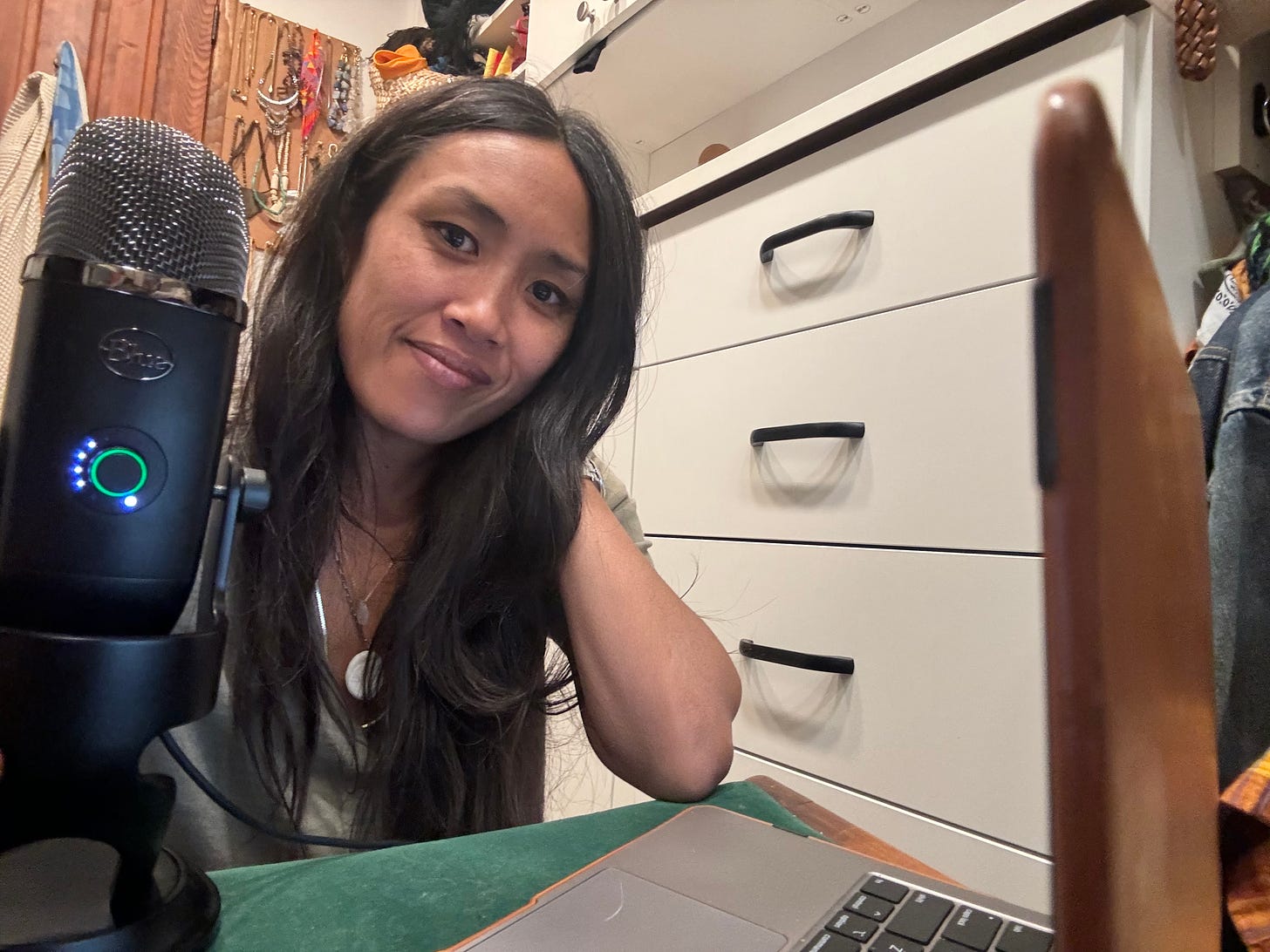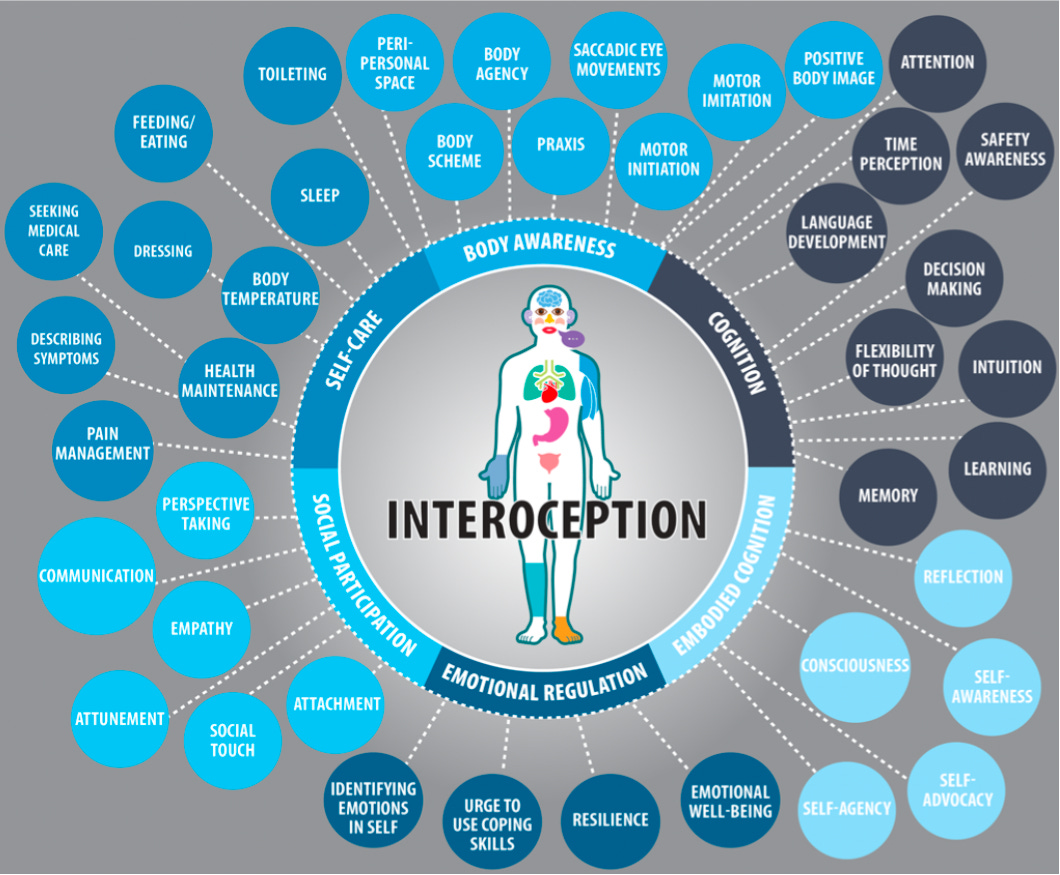Fearing the future after a digital detox
Are you skilled at interoception, our 7th sense? + a discovery from my longest online break
Have you tried living under a rock for awhile? Although I didn’t plan on it, I was like a hermit under a boulder all summer.
While in hiding, I had no idea someone tried to assassinate Donald Trump until my husband told me two weeks after the incident. He also broke the news to me a week after everyone else knew that Biden bowed out and Kamala is in. I’m unaware of the latest on wars across the world. And I didn’t watch any Olympic highlights, except for a 30-second video my sister sent me of an Australian woman doing the sprinkler in possibly the cringiest interpretation of breakdancing I’ve ever seen.
In mid-June, my nervous system — the intricate map of messages between my brain, nerves, and spinal cord — was rattling in a way I had never seen before. The threads of my nerves short-circuited and needed to cease. I had been here several times in the last few years, this time it hit different, and harsher.
Unlike many of my previous detoxes, I didn’t make a detailed plan to unplug.
I just stopped, halted my online habits.
An inner voice told me to hit the brakes then I went under the radar and stayed there for awhile. Since the ubiquity of smartphones, this has been the longest Internet break I’ve encountered, at nearly 3 months.1
It meant no scrolling on social media, no guilty pleasure lurking of tiny homes and van lifers on YouTube, no reading the news or my favorite essayists on Substack. I haven’t listened to a podcast this entire summer. Unless my kids are in the car, music is out, too. I drive in silence.
I’ve walked more than 100 miles without a phone in my pocket. Plus, I’ve been engaged in lots of other analog -ings. Reading books. Being with my kids and husband. Baking bread. Napping, oh god, lots of those. And staring into space. As for writing, it’s been me and my journal and a pencil.
I haven’t written anything on my laptop, or published my words on the Internet like I’ve done consistently for two years. In fact, today’s newsletter is the first time I’ve tapped my fingers on the keyboard in months.
While under this rock, I’ve noticed the major gap in my understanding of what’s happening inside my body.
Researchers and neuroscientists have been digging deeper into this very phenomenon, called interoception.
According to the American Psychological Association, “Interoception is the ability to be aware of internal sensations in the body, including heart rate, respiration, hunger, fullness, temperature, and pain, as well as emotion sensations.”
Interoception can happen consciously (like when your brain identifies feeling hot and you take off your sweater) and subconsciously (like your body and brain’s feedback to keep blood sugar levels stable), which makes it a fascinating topic for psychologists to investigate. For example, a team of researchers have been examining interoception with soldiers, who can ignore pain or fear in battle, which is helpful in real time. However, how does their interoception affect them when they’re no longer in fight or flight situations?
Over the last several years researchers have explored how a better understanding of interoception can help those with eating disorders, suicidal behavior, and folks like me, with mental illness.
It seems straightforward — something happens in your body, you experience bodily awareness and its sensations, and then you react accordingly. Except, for many of us, it’s actually complex and not that simple. We have varying degrees of interoception and for different sensations.
For me, I may be a pro at interoception when it comes to identifying I’m hangry, hence why I always carry ER nuts in my purse. But I’m seriously lacking interoceptive abilities elsewhere.
I often run high (hello, anxiety), and then go low (depression), both without a better understanding or awareness of what’s happening before I get to each destination. I arrive at each place, in a drastic swing. Can a higher level of internal awareness change the trajectory of extreme mental fluctuations?
I wonder if this summer created more space for interoception.
Being a mom on a typical day can be a lot on the nervous system. I can be faced with any normal kid thing — they can laugh, or ask me questions, say goofy things. If I’m in a headspace that’s not ready for it, my temper skyrockets, I yell and, basically, lose my shit.
Lately, I am able to pause, which sounds insignificant as a behavioral change except it’s not for me.2 In a mere half-second I recognize I’m going berserk.
I’ve been able to acknowledge what’s happening and, on good days, I can calmly tell my family, “I’m feeling really overwhelmed right now,” and then I give a cue for what I need. In these more interoceptive moments, I can ask them to stop the noise, or stop what they’re doing, or say that I need to be by myself (then I GTFO, quick).
In the time alone, I notice things happening in my body. I feel my heart pounding, the tension in my neck, and an irregular breath.
Noticing what’s happening, and then voicing it, is a subtle change with big impact. Why didn’t I do this more before?
I point to my phone and laptop. Communication between our body and brain is a complex dialog. Adding in external stimuli like the flutter of our phones and computers interrupt the conversation between our body and brain.
How often are we actually noticing what’s happening to us when we’re on them? I bet we don’t notice the toll until we’ve taken a notable break away from the excessive external noise, whatever that may be in our lives.
Now I’m afraid of losing all the progress I’ve made. I’m confused about where to go from here. I started this essay more than two weeks ago and I’ve been sitting on it.
I’m scared to integrate back online and what it will do to my psyche.
I know it’s not realistic for me to completely shut off external technological stimuli forever. I’m in a constant state of reminding myself I do have the power (and privilege) to rearrange how it exists in my life.
A friend suggested the idea of a writing project only for myself for a longer period of time, maybe to be published online later, or never. I’m toying with sending out my newsletter a couple times a month rather than every week. Friends have shared podcast episodes they think I’d enjoy yet I can’t fathom adding more noise to my head so those audio links stay in my phone; perhaps one day I’ll have the mental stamina to listen.
Last week, I went on Substack’s social media platform, Notes, for 10 minutes and what I thought would be a harmless activity quickly became a terrible idea. If I’m understanding my 6th sense of interoception correctly, going on social media raises my heartbeat and I tend to hold my breath, which leads to anxiety. I responded this time by shutting it off. I haven’t gone on it since. If and when I do again, will I have a strong internal sense to stop it?
Here I am, still under this rock and I’m barely peeking my head out. And I’m sort of flailing at the idea of going back to the real world. While I’m here, I’m faced with choices, changes, experiments, and I’m unsure what to do.
What has been your longest Internet break? What showed up for you during this time? How did you ease back into it, if you did?
Probably around 2007, when the iPhone came out. I remember commuting from Oakland to San Francisco on BART and staring at my 2G after a 10-12 hour day on my computer and I’ve been nonstop since.
Except on Sunday. I did not pause, I did not act calm. Who was the monster who looked like me and showed up in my house?! Oh my god, hormonal shifts are real, people. Probably a story for another day.







I’ve missed your voice here. So glad you are back to writing.
There is such power in the pause. I’m working on this, too. My mind is so noisy already so when I saturate it with outside chatter/opinions/feeds, it gets all snarled up.
Just yesterday my therapist reminded me of the quote/saying: “Don’t do something, just stand there.” And if I expand this to don’t listen to something, just be there - I think I would benefit.
This essay is super helpful to me, particularly that image of the breakdown/impact of interoception. Thanks for sharing how this detox went for you. It sounds like it may have reset your factory settings. Something I need 🙃
I set an intention at the beginning of 2024 to have a digital detox every Sunday. One day a week to defrag and get off my phone /off line. I last I think 5 weeks. It was so much harder than I imagined. Clearly, I have things to look at here.
I have no skills in this -- except hunger and thirst. I wonder, too, how gendered this is. I think I was socialized not to notice anything I needed so I could attend to what other people need. Interesting to ponder. I hope you keep taking care of yourself.